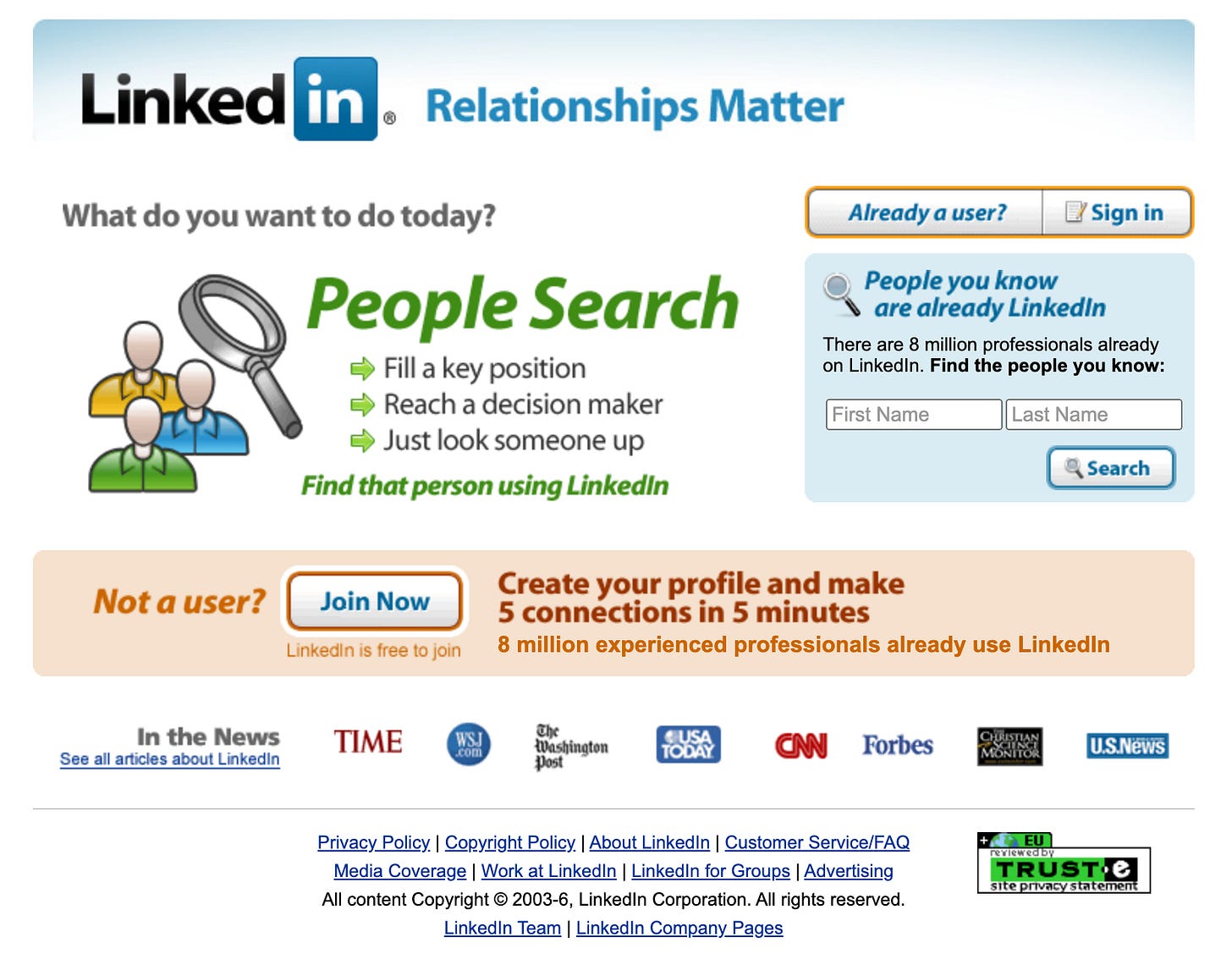How Reid Hoffman convinced us to put our resumés online
My 2006 podcast with LinkedIn’s founder offers clues to the secret of his success
When I launched Venture Voice fifteen years ago, it was the first podcast dedicated to interviewing entrepreneurs. After a decade-long podcast hiatus to focus on growing my own companies, Muck Rack and The Shorty Awards, I’m excited Venture Voice is back. In addition to new interviews (starting with the most recent episode with Mark Cuban), I’m re-releasing some of the early episodes with new introductions. Today, I’m pleased to bring you an interview with Reid Hoffman, recorded in 2006, that shows we can learn from what these now wildly successful entrepreneurs were thinking about when they were just getting started.
Listen now on Apple Podcasts, Overcast and Spotify. If you love it, please leave a review!
Special thanks to our sponsor, SteadyMD.

A trip back in time: What LinkedIn looked like in 2006, when this interview was recorded.
Over a decade ago, I interviewed LinkedIn founder Reid Hoffman for this podcast at a time when MySpace was the largest social networking site in the world. This was also the first year that LinkedIn, which had only 56 employees when this was recorded, would record a profit. I wanted to look back to find out what Reid was doing at the time that set LinkedIn up for such success.
“The very first time you’re doing startups, it’s like, oh my God, drinking from a firehose is too tame of a metaphor.”
Fifteen years ago, it was still unusual to put your resumé online for the world to see. It implied that you were looking for a job or, worse, desperate for a job. In 2006, you didn’t search for professional connections on the internet; you did it over a round of golf or at a chamber of commerce meeting.
So even though LinkedIn had 7.2 million users by 2006, it was still very much a niche platform, and there were no guarantees it would have staying power. Lots of social networks get to that level, or even beyond, and then flame out (remember Friendster?).

Reid Hoffman’s LinkedIn profile today
Of course, LinkedIn didn’t flame out. Now a division of Microsoft, it’s grown to over 700 million users (over 100 times the size it was in 2006) and made its founder a billionaire in the process. Revisiting this episode, you can pick up on some of the clues about why Reid would become so successful.
“What motivates me is big projects that change the world...part of a theme, I think, of the internet is essentially, power to the people.”
As a fellow philosophy major, I can see how Reid served as the company’s Chief Philosopher in many ways. He spent a lot of time trying to understand the social nuances of what it would take for people to want to put their resumés online. He also thought a lot about how he could deliver more value so that users would want to log in daily, not just when they were looking for a job. For entrepreneurs, that’s a great reminder of how important it is to put ourselves in the shoes of our users.
“Especially in early-stage, young companies, PR is pretty useful...The easiest way to get your average consumer’s attention is, they trust journalists and big brands of media vehicles that they’ve already had alignment with to be a good editorial filter.”
Reid also talked about the importance of PR, something that stuck with me as I later launched Muck Rack to help PR teams and journalists communicate. As he pointed out, when journalists write about your company, that gives you credibility and legitimacy. It’s a powerful way to get your message out.
Something else that struck me is that Reid talks a lot about his peers — Mark Pincus, Peter Thiel, Stewart Butterfield — fellow entrepreneurs who hadn’t yet made it big but went on to do big things. The lesson there: Don’t take your peers for granted. I think about that with my own peer network back then and how valuable they still are to me today.
When I spoke to Reid in 2006, I was a fledgling entrepreneur, with maybe one or two people on my team. Between my companies Muck Rack and The Shorty Awards, we’ve now grown to about 100 employees — more than LinkedIn had at that time. These conversations were hugely instructive to me as I was growing my businesses, and I’m discovering new insights now by revisiting what a mammoth company like LinkedIn was thinking about when they were first getting started.
To me, the roots of LinkedIn’s success go back to something Reid said right at the beginning of this episode: His first career choice was to be a “public intellectual,” because he wanted to hold up a lens to who we are and who we should be, as individuals and as a society.
“And what I realized was,” he says, “if you looked at software and you looked at online services as the media objects that could do this, you could go create really valuable media objects that would have a much deeper transformative effect on society, where you hold up that lens and help people evolve to who they should be or who they want to be.”
Spoken like a true philosopher — and successful entrepreneur.
Listen on your favorite podcast platform:



